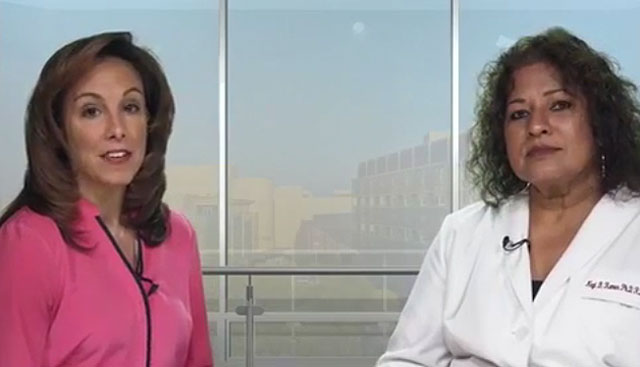
Ask the Experts: Your Questions About Nutrition and Cancer Answered
Dr. Nagi Kumar, director of Cancer Chemoprevention at Moffitt Cancer Center, connected with our Facebook friends in the Ask The Experts: Eat This, Not That to debunk common food myths and answer your cancer-related nutrition questions.
Here are some abbreviated questions Dr. Kumar answered during her interview. Watch the video below for a complete recap of the Facebook Live event.
1. About 78 million Americans are obese, according to the National Cancer Institute, being overweight and obese is often a risk factor for cancer. Can you tell us how weight factors in into cancer risk?
In our research, we have seen that obesity and being more heavyset contributes not only to cancer but also to other chronic diseases. We also find that obesity contributes to metabolic changes such as changing the endocrine system or the hormonal system, it puts the hormones into a chaotic environment that can trigger cancers. Another way that obesity contributes to cancer is by increasing chronic inflammation.
2. Does sugar really feed cancer?
That is one of the theories. Sugar does feed cancer but there are also a lot of other things that happen along with sugar that makes cancers grow, so you can’t pinpoint sugar as the only source of nutrition for the cancer. Cancers are very clever. They take your protein, carbohydrates and fat. They are not very specific. One tumor we think is specifically partial to glucose is the brain tumor. There is a lot of promise there to target these brain tumors with diet, such as ketogenic diets, where you deprive the tumor of carbohydrates or sugars, not allowing it to grow. Tumors are highly energetic and absorb all the nutrients that you consume.
3. What exactly are probiotics and prebiotics? How do they impact our health?
Probiotics are millions of microorganisms and bacteria that are in your system. It starts from the oral cavity down to your digestive tract. Probiotics are very important. They are a dynamic population of bacteria that prevent carcinogens, cancer-causing agents, from being absorbed. Probiotics also absorb phytochemicals better. There are millions of them in our body and it is important to keep them alive, what keeps them alive is prebiotics. Prebiotics make the probiotics thrive in our system. Prebiotics are in nuts, whole grains and fiber-filled foods that are consumed. It is important to consume high-fiber foods and nuts as well as fermented foods like yogurt, tofu and miso. A combination of these every day in your diet is very critical to maintaining good health.
4. Is there any benefit in following a strict vegetarian diet for those who have advanced stages of cancer?
There hasn’t been much evidence that shows vegetarianism helps the cancer patient as far as survival or whether the cancer returned. I would recommend a predominant intake of plant foods but also include the valuable proteins in your diet. Including proteins is important because if you are post-treatment for cancer, you probably have anemia or other deficits that you don’t want to continue to have. Eating a vegetarian diet hasn’t shown to improve longevity or survival rates.
5. Can high fiber foods prevent colon cancer?
Yes, there has been research done looking at high fiber foods, both soluble and insoluble. Soluble fiber comes from fruits and vegetables, insoluble fibers comes from wheat grain and other whole grain foods. Fiber impacts the risk of colon cancer because it changes the pH of the acids in the colon. It doesn’t allow the acids to impact the lining of the colon, thus preventing colon cancer. There are two things someone at high risk of colon cancer can do, which includes eating a high fiber diet and increasing physical their activity.
6. Gluten-free diets, bad or good? What exactly is gluten?
Gluten is a carrier, or storage, protein. It is presented in high levels in wheat and barley. People think that if they eat a gluten-free diet that they will lose weight, but there is no evidence to believe that. The only people that have to avoid gluten are those with an allergen or intolerance to gluten, commonly known as Celiac disease. It is often diagnosed early in life. Only 1 percent of the world’s population has Celiac disease.
